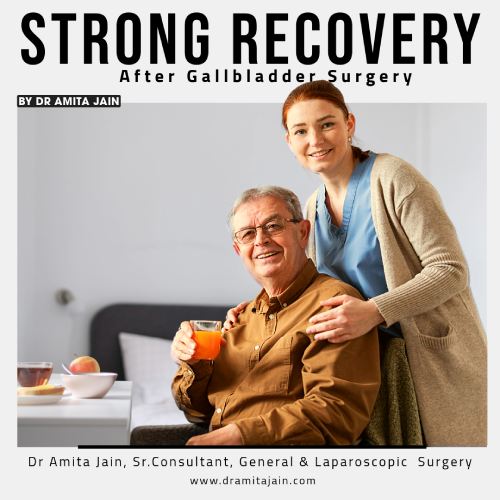All surgeries carry their risks and complications. The gallbladder, a small pear-shaped organ located in the upper right quadrant of the abdomen, aids in digestion by storing bile produced in the liver, which helps break down fats. When fatty foods are consumed, bile is released from the gallbladder into the small intestine to facilitate digestion. However, sometimes, substances like cholesterol and bilirubin can accumulate in the gallbladder, forming stones that cause pain and discomfort. In such cases, surgery is the only solution.
Dr Amita Jain who is one the leading gallbladder surgeons in Delhi in the field of laparoscopic surgery, explains how one can ensure a strong recovery after Gallbladder Surgery in this article.
How do you ensure a good recovery after gallbladder surgery?
Listen to your doctor’s advice
It is essential to follow proper wound care post gall bladder surgery to ensure a strong recovery. By adhering to your doctor’s instructions for caring for your incisions, such as keeping them clean and dry, changing dressings as advised, and monitoring for signs of infection, you can facilitate healing and prevent complications.
Avoiding submerging the incision in water until it has fully healed is crucial in preventing infection and promoting optimal healing. If any signs of infection, such as increased redness, swelling, warmth, or drainage, are noticed, it is imperative to contact your doctor immediately for prompt treatment.
Additionally, taking any prescribed medication as directed and informing your doctor of any other medications you may be taking is essential for managing pain and preventing adverse reactions. Following these guidelines diligently can significantly contribute to a successful recovery from gallbladder surgery.
Rest is A Must
Adequate rest is crucial for a successful recovery from gallbladder surgery. It allows your body to focus on healing, minimizing the risk of complications and expediting your recovery. After the procedure, lying on your back helps relieve pressure on incisions, while sleeping on your left side is preferable.
Creating a tranquil sleep environment, with darkness, silence, and cool temperatures, enhances relaxation. Keep essentials nearby for convenience, like pain relievers and water, and consider using earplugs and an eye mask to block out disturbances for uninterrupted rest.
A Balanced Diet is Essential
A well-balanced diet is crucial for a speedy recovery after gallbladder surgery. Without the gallbladder, digesting fats becomes challenging, so it’s essential to avoid fatty or greasy foods initially. Instead, focus on high-fiber foods, lean proteins, vegetables, and whole grains. Gradually reintroduce fats into your diet and monitor how your body reacts.
Some foods, like high-fat or fried foods, spicy foods, caffeine, alcohol, and gas-producing foods, should be limited. On the other hand, foods rich in fiber, such as whole grains, fruits, and vegetables, aid digestion and promote overall well-being. Consulting with a doctor or dietitian can provide personalized guidance for a smoother recovery.
Limit your physical activity
After gall bladder surgery, it’s crucial to limit physical activity at home initially. Your body needs time to heal, so follow the advice from your doctors about what you can and can’t do. Avoid heavy lifting and strenuous exercise, as these could strain your abdominal muscles.
Gradually increase activity levels as advised, paying attention to your body’s signals to avoid overdoing it. Rest is important for recovery, but don’t stay in bed all day. Moving around, even just walking, helps you get stronger and prevents blood clot formation. Wait until your doctor gives the green light before starting any exercise routine.
Hydration is Important
Hydration is essential for a swift recovery after gallbladder surgery. Studies suggest that drinking lukewarm water post-surgery can aid bowel movement, preventing constipation. Proper hydration supports digestion and overall health.
It’s recommended to drink at least eight glasses of water daily and adjust based on individual needs and activity level. Doctors advise staying adequately hydrated to promote a stronger recovery.
Once you know the key steps for a strong recovery after gallbladder surgery—listening to your doctor, resting adequately, maintaining a balanced diet, limiting physical activity, and staying hydrated—you can pave the way for a smoother and quicker healing process.

Dr Amita Jain is a surgeon with the highest degree of professional competence, precision and surgical craftsmanship. Performed all complicated general surgery procedures with in depth knowledge of invasive and few minimal invasive and onco surgical techniques. Underwent special training in trauma, executed various trauma-related complex life-saving neurosurgical procedures, reconstructed injured mangled limbs and performed vascular and reconstructive procedures with critical care.
Dr Amita Jain holds 28 plus years of rich experience in Trauma and General Laparoscopic Surgeries (including Gallbladder stone removal, appendix removal, hernia repair surgery, piles and fissure surgeries). She was the Professor Surgery of at the Army College of Medical Sciences and Base Hospital Delhi Cantt. In 1994 she was commissioned as Surgeon under the United Nations Mission in Congo. From 2020 to 2022, she worked with Bansals Hospital. Currently, Dr Amita Jain is the Senior Consultant, (Speciality: General and Laparoscopic Surgeon) at Artemis Lite Hospital, New Delhi and Sr. General and Laparoscopic Surgeon at Rainbow Children Hospitals, Malviya Nagar, Delhi.
